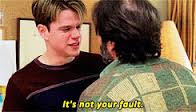
Hi, my name is Michele, and I over-function. Among other things, this means that when I have to face some hard truths about myself and can’t see myself as a victim of others, I step in and judge myself –usually as harshly as possible. I condemn myself for being an unappreciative shrew, or a bitchy nag of an employee/friend/colleague.
In my work, I often hear indecisive people calling themselves “weak”, emotional individuals calling themselves “wrecks”, those who make mistakes calling themselves “idiots.” One cannot consider and make use of constructive criticism from yourself or others if all criticisms are received as harsh pronouncements of how terrible you are.
It is impossible to lead yourself without having empathy for yourself. Empathy is different from forgiveness. Empathizing with yourself means standing in your own shoes in a tough time. It means opening the door of that room that you closed so long ago and seeing what it was that made you develop the story you did.
When we look at ourselves without judging, some of the stuff we don’t like about ourselves becomes much more understandable. Of course it was easier for me to be passive-aggressive at work than to accept responsibility and look for the next right action to take. The practice of empathy leads to forgiveness as it allows me to see myself more clearly. And then we get to say: “Oh, now I see why I do that. Now I get where that came from.”
Once we see the source of our choices with empathy’s help, we can separate and say; I am not that child or person any more. I’m a grown up now. I have control over my life. I don’t have to keep repeating the same patterns over and over again.
Without empathy, though, that’s almost too big of a leap to take. When we revisit our original stories, we have to remember that our issues resulted from us wanting good things, and we can’t begin to untangle those threads without showing ourselves compassion.
Also, when we are gentle with ourselves, it helps us to not get defensive when we encounter the truth. Yes, I can be a shrew and a nag. I don’t need to waste my energy defending myself on those points. When I am able to look at my behavior without criticizing it, I won’t get sidetracked by the need to judge.
The goal is simply to understand. Not to beat ourselves up or make a list of areas to improve on or get more insight into what we need to work on or fix. Instead, we want to be able to explore our self-judgments, examine them, and expose how inconsistent they are with reality. That’s when the real change can begin.
Try this: Think of a common judgment you level against yourself.
Imagine yourself giving those messages to another person. You would probably think that you were being overly harsh and critical. Are you really so undeserving of love and recognition? Why is it okay for you to think of yourself that way?
As we practice empathy, we will find that we become aware of how and when our inner story controls your actions. Once we become aware of that story, we will start to see its influence on every relationship we have—work, loved ones, ourselves.
When we are able to extend empathy to ourselves, we will start to make different decisions—based on who we are what we need today. We will start to get a glimpse of the freedom and authenticity that lie ahead. This is an exciting moment, and readies us for what’s next; writing a new story, and leading a new life.
